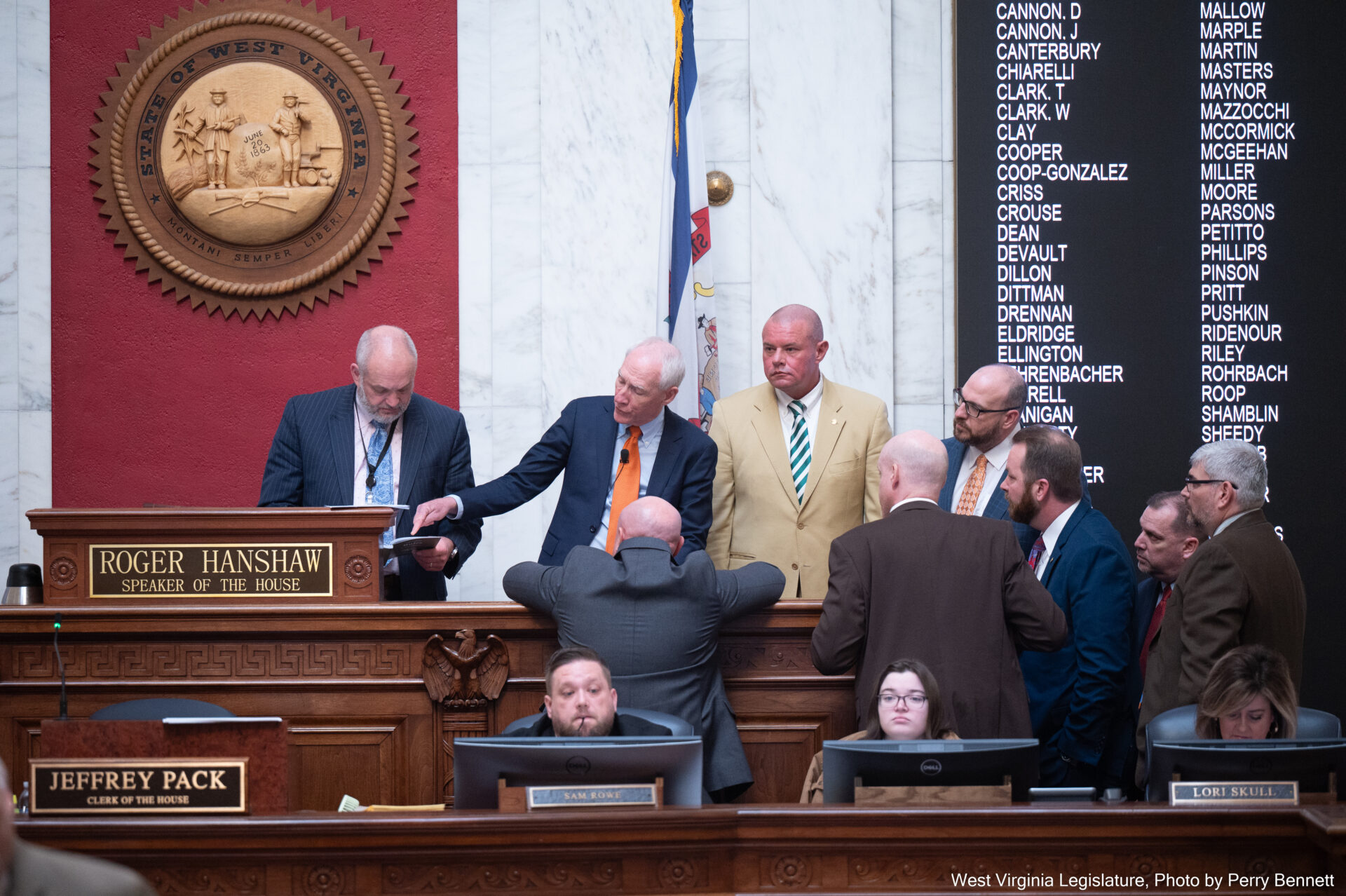Before they got down to business, the House of Delegates was delayed for close to two hours due to procedural wrangling.
Business came to a grinding halt in the House Friday morning after Del. Chris Anders, R-Berkeley, presented a motion to discharge House Bill 2007 from the House Health and Human Resources committee. That would mean it would leave the assigned committee and move directly to the House floor for debate.
The bill would repeal a regulatory process – called certificate of need – or CON for short – required to expand health care services. It has been a focus of lawmakers for years and is a legislative priority for Gov. Patrick Morrisey, but was tabled in committee a month ago.
A similar bill was voted down in the Senate Health committee.
What followed Anders’ motion was a morass of parliamentary procedure, with opposing motions, rules interpretations and debate. Several times Speaker Pro Tempore Del. Matthew Rohrbach, R-Cabell, had to clarify what action lawmakers were voting on.
“We’re moving the previous question, just moving to move on back to where we were with the gentleman’s motion to discharge,” Rohrbach said. “But this is on the vote from the delegate from the 65th, motion to call the question, that’s what the house is voting on right now.”
Ultimately lawmakers voted 74 to 16 to keep the certificate of need bill in committee.
After the almost hour-long procedural slog, Democrats began to present other motions to discharge bills out of committee. Lawmakers voted to discharge House Bill 3270, which would require legislators to submit to a drug test. But a double committee reference now sends it to House Finance.
The House of Delegates quickly recessed for an hour. On their return, lawmakers voted to suspend rules and move directly to the passage of bills without hearing any more motions.
Voter Identification
State code generally already requires voters to show some form of identification at the polls to prove their voting eligibility. House Bill 3016 would require that to be a photo ID — namely, a driver’s license, passport or a resident identification card.
House Democrats stood in opposition of the bill, saying it created an unnecessary barrier to voting. Del. Mike Pushkin, D-Kanawha, argued there was no evidence of voter impersonation, and state’s existing laws were sufficient to protect election integrity.
“This hasn’t happened here. There’s not people showing up as someone to vote. If somebody shows up and they’re not registered to vote in the state, their vote doesn’t count,” Pushkin said. “We do have voter ID laws on the books, and we haven’t had any issues. So the only thing I could see, what the unintended consequences of this would be, is that some seniors who no longer drive might not have kept up with what we’re doing here at the legislature and when they show up and would be not allowed to vote, or the vote wouldn’t be counted, were likely to disenfranchise some of our older members of our society, and for what? We’re preventing a problem that is not taking place.”
Supporters of the bill, like Del. James Akers, R-Kanawha, and chair of the House Judiciary Committee, argued that voting was not being obstructed. Akers pointed to exceptions to the ID requirement maintained in the bill, including allowing both poll workers and third parties to confirm a voter’s identity in person.
“This bill provides for all of those exceptions for folks to vote if they don’t have a photo ID. And let’s also recall that you can vote absentee in this state without a photo ID,” he said. “So the argument I’ve heard that if you can’t get to the County Clerk’s office to get your picture taken, or if you can’t get to the DMV to take your picture taken, if you’re going to go vote in person, you’ve got to somehow get to the polls, which is no harder than having your picture taken at the County Clerk’s Office of the DMV.”
Akers also said the bill contains another exception to allow voters to use an expired ID at the polls if the ID expired after their 65th birthday.
The bill to require voters to show photo identification at the polls passed on a vote of 84 to 8 along party lines and now goes to the Senate for further consideration.
Sex Offender Registry
House Bill 3164 would require registered sex offenders to pay an annual fee of $125 for the maintenance of the state’s Central Abuse Registry.
Several lawmakers stood in opposition of the bill as being detrimental to the reintegration of offenders that have served their time. Del. Larry Kump, R-Berkeley, worked as a group therapist for sex offenders during his time working in corrections. He spoke emotionally about the difficult road to recovery for many of his clients.
“They are itinerant. They go from one job to another, and this is a burden,” he said. “This is not a service that they asked for. It’s a service that the state demands of them, and appropriately so, I think these services by the State Police should go on, but they should be funded from the state police budget and not on the backs of the sex offenders. I oppose this bill.”
Supporters argued that the fee would help to improve services for victims, as well as rehabilitation of offenders.
The bill to require registered sex offenders to pay an annual fee to maintain the state registry passed 88 to 10 and now heads to the Senate for further consideration.
